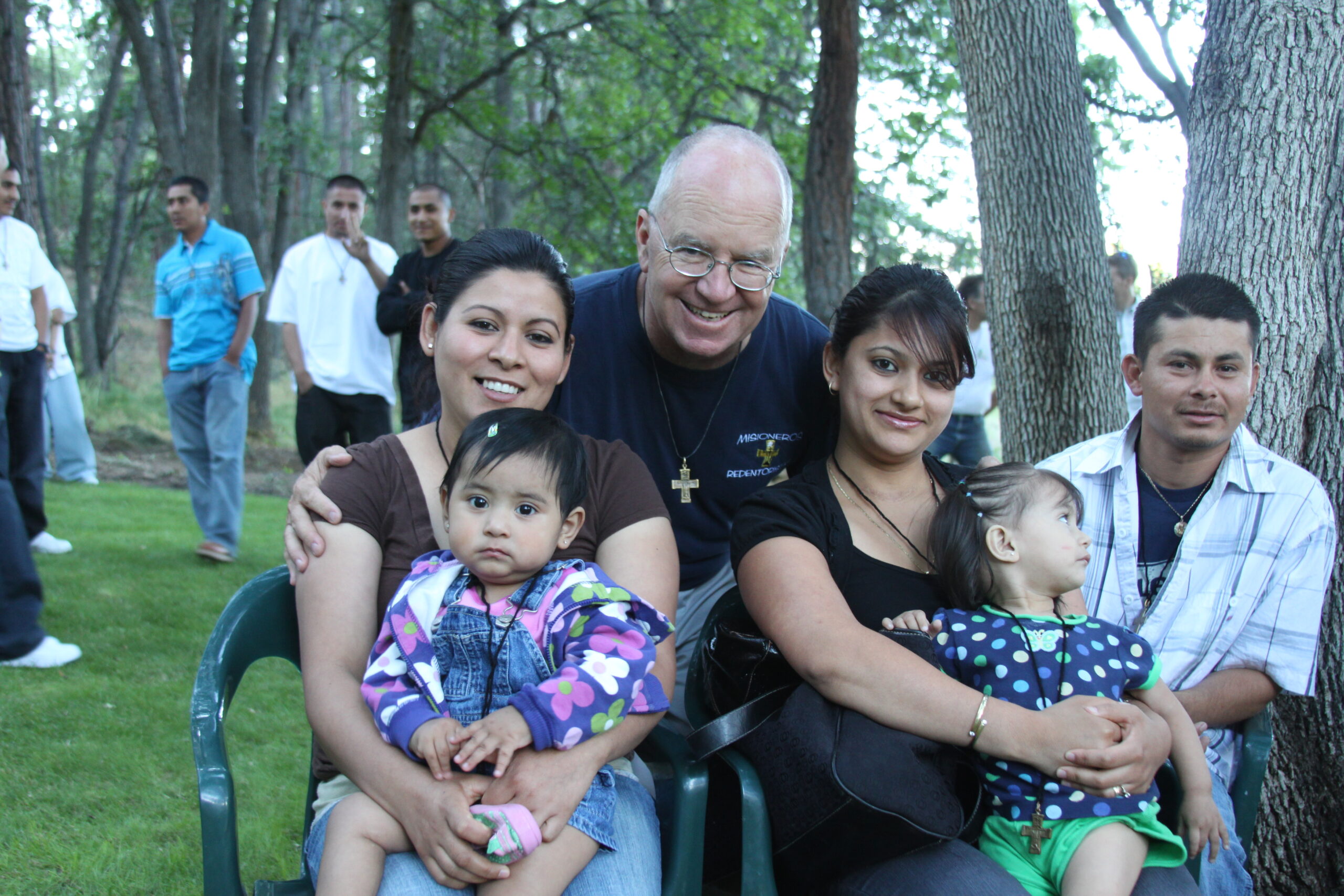Evangelization 2021: Ayudar a los padres a enseñar a sus hijos – Helping parents teach their children
Ayudar a los padres a enseñar a sus hijos
Mientras predicaba una misión parroquial en Arkansas, fui a cenar a la casa de una familia que asistía a la misión. La madre dijo: “Padre, ¿por qué mi hijo Carlos no puede recibir su Primera Comunión?” Le pregunté: “¿Cuál es el problema para la parroquia?” Ella explicó que solo podía asistir a la iglesia una vez al mes ya que su esposo tenía que trabajar tres domingos al mes en la empacadora y vivían a diez millas de la iglesia. Solo tenían un coche y ella no podía conducir. Las clases de Primera Comunión eran los domingos por la mañana, por eso, su hijo solo podía ir a las clases una vez al mes. El director de educación religiosa lo retuvo de la Eucaristía debido a la falta de asistencia a las clases. La madre insistió que él estaba listo y comprendía la Eucaristía.
Le pregunté: “¿Cómo se ha preparado para recibir su Primera Comunión?” Explicó que ella era catequista en México. Carlos tiene nueve años y Lupita seis. Los domingos cuando no pueden asistir a misa, después de que sus hijos desayunan, ella reza el rosario con sus hijos. Después del rosario, utilizando su catecismo para niños en México, les enseña a sus hijos sobre la fe católica. Todas las noches, cuando los niños se iban a la cama, ella rezaba con cada uno de ellos junto a su cama. Le aseguré que cuidaremos de Carlos. Después de que el pastor oyó de la familia, dijo: “Es maravilloso que estén educando a sus hijos en casa. Dígale que su hijo puede recibir con la clase en tres semanas. Yo me encargaré con el director de educación religiosa”. “
Esto tuvo lugar hace más de veinte años, y desde entonces, he trabajado con varias familias que quieren que sus hijos aprendan su fe, pero les resulta difícil participar en programas de educación religiosa parroquial. Este no es solo un problema que se encuentra al trabajar con la comunidad hispana. Necesitamos escuchar a los padres y ofrecer la oportunidad para que sus hijos reciban la gracia de los sacramentos. Ningún programa religioso puede responder a las necesidades y situaciones individuales de cada familia dentro de una parroquia. Cuando presento las historias de personas que necesitan atención especial, los líderes pastorales piden recomendaciones de programas. Muchos se frustran cuando no recomiendo un texto o un solo método. Aquí hay cuatro principios que me han guiado en mi búsqueda de que los sacramentos están disponibles para las familias al margen de la Iglesia.
- Entrevista: Quiero conocer la vida de fe de las personas que piden un sacramento. He preparado muchos formularios de inscripción para programas de catequesis y siempre encuentro su utilidad limitada. Hago una entrevista a la persona que pide un sacramento antes de asignar a una persona a una clase o programa. En la entrevista personal, a medida que se recibe la información necesaria para registrar el sacramento, aprendo las necesidades espirituales de toda la familia y puedo invitar a la familia a la vida de una parroquia.
- Comprender la fe de los padres: intento alejarme del “debería” y del “tenía que” al guiar a los padres a transmitir la fe a sus hijos. Confíe y anime a los padres en su fe. Invite a los padres a orar con sus hijos. A menudo, la gente dice de sí misma: “No soy un buen católico”. Asegúreles que Dios los ama y nuestra comunidad les da la bienvenida.
- Aborde las necesidades sacramentales de toda la familia: sin crear obligaciones que desalienten a los padres, anime a los padres a que traigan a toda la familia a la familia de la Iglesia. Enseñe formas de santificar el Día del Señor dentro de las limitaciones de las vidas al margen de la Iglesia y la sociedad.
- Ayude a los padres a enseñar a sus hijos: La fe no es complicada ni difícil. Simplifique el mensaje de fe. El mayor mandamiento es amar a Dios y amar al prójimo.
La mayor dificultad de involucrar a los padres en la educación de sus hijos no es presentarles la doctrina, sino presentarles una imagen amorosa de Jesús y de la Iglesia. Quizás, COVID nos da un momento de gracia, para considerar los fundamentos de nuestra fe y no complicar nuestra oración y expresiones de fe.
(Mañana: Entrevista)
Helping parents teach their children
While preaching a parish mission in Arkansas, I went to dinner in the home of a family attending the mission. The mother said, “Father, why can’t my son Carlos receive his First Communion?” I asked, “What is the problem for them at the parish?” She explained that they were only able to attend church once a month as her husband had to work three Sunday’s a month at the packing house and they lived ten miles from the church. They only had one car and she could not drive. The First Communion classes were on Sunday mornings, so he could only go to the classes once a month. The religious education director held him back from Eucharist because of lack of attendance at the classes. The mother insisted that he is ready and understands the Eucharist.
I asked, “How has he prepared for receiving his First Communion?” She explained that she was a catechist in Mexico and Carlos is nine and Lupita is six. On the Sundays when they are unable to attend Mass, after her children had breakfast, she, Carlos and Lupita pray the rosary, and after the rosary, using her catechism for children in Mexico, she taught her children about their Catholic faith. Every evening when the children went to bed, she prayed with each of them by their bed. I assured her that Carlos will be taken care of. After the pastor learned about the family and said, “Isn’t is wonderful that they are home schooling their children. Tell her that her son can receive with the class in three weeks. I will take care of it with the religious education director.”
This took place over twenty years ago, and since that time, I have worked with a number of families who want their children to learn their faith, but find it difficult to engage in parish religious education programs. This is not solely a problem found in working with the Hispanic community. We need to listen to parents and offer timely opportunity for their children to receive the grace of sacraments. No religious program can respond to the individual needs and situations of every family within a parish. When I present the stories of people who need special attention, pastoral leaders ask for program recommendations. Many are frustrated when I do not recommend a text or a method. Here are four principles that have guided me as I seek to make the sacraments available to families on the margins of the Church.
- Interview: I want to know the faith life of the persons asking for a sacrament. I have prepared many different registration forms for catechetical programs, and always find their usefulness limited. I do an interview of the person asking for a sacrament before assigning a person to a class or a program. In the personal interview, as information needed for recording the sacrament is received, I learn of the spiritual needs of the entire family and can invite the family into the life of a parish.
- Understand the faith of the parent: I attempt to stay away from ‘should’ and ‘must’ in guiding the parents in passing the faith to their children. Trust and encourage the parents in their faith. Invite the parent to pray with their children. Often, people say of themselves, “I am not a good Catholic.” Assure them that God loves them, and our community welcomes them.
- Address the sacramental needs of the entire family: While staying away from creating obligations that discourage parents, encourage parents to bring the entire family into the family of the Church. Teach ways of making holy the Lord’s Day within the constraints of lives on the margins of the Church and society.
- Help parents teach their children: Faith is not complicated or difficult. Simplify the message of faith. The greatest commandment is to love God and to love our neighbor.
The greatest difficulty of engaging parents in the education of their children is not in presenting doctrine to their children, but presenting a loving image of Jesus and of the Church. Perhaps, COVID gives us a moment of grace, to consider the basics of our faith and to not complicate our prayer and expressions of faith.
(Tomorrow: Interview)




